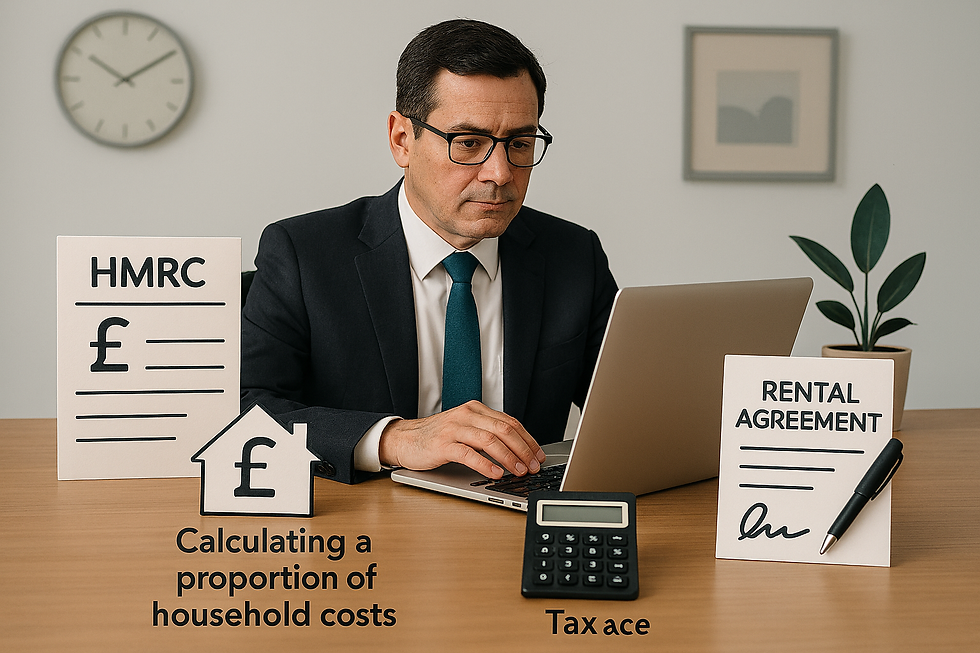Understanding the Tax Differences Between Sole Trader and Limited Company in the UK
- nk2095
- Sep 26, 2024
- 3 min read
Updated: Oct 4, 2024
We often get asked by small businesses whether to operate as a sole trader or a limited company. The tax implications can play a significant role in your choice. Here’s a breakdown of the key differences:

1. Sole Trader
As a sole trader, you and your business are legally the same entity. This means you're personally responsible for any debts or liabilities. In terms of taxation, you’ll pay Income Tax on your profits through Self-Assessment and you'll also be subject to National Insurance Contributions (NICs) based on your earnings.
Advantages: Simpler accounting and fewer administrative responsibilities.
Disadvantages: You pay higher rates of tax once your income reaches certain thresholds, and you are personally liable for any debts.
2. Limited Company
A limited company is a separate legal entity, which means you, as the owner, are not personally liable for the company's debts (unless you’ve given personal guarantees). A limited company pays Corporation Tax on its profits, and as the owner, you’ll typically take income in the form of salary and dividends. This can often result in a more tax-efficient structure for higher earnings.
Advantages: Lower tax rates on dividends and greater scope for tax planning and flexibility.
Disadvantages: More administration and compliance, including filing annual accounts with Companies House and a corporation tax return with HMRC.
Tax Efficiency and Earnings
For sole traders, paying Income Tax and NICs on all earnings can quickly become burdensome at higher levels of income. Limited companies, however, offer more flexibility in managing how and when profits are drawn, often allowing owners to pay themselves a combination of salary and dividends, which can reduce their personal tax liabilities.
For example, dividends are currently taxed at lower rates than salary, making this a common strategy for business owners looking to reduce their overall tax burden. However, it’s important to consider the costs of running a limited company, which include filing fees, accountant costs, and potentially higher regulatory requirements.
National Insurance Differences
As a sole trader, you’ll need to pay Class 2 and Class 4 National Insurance Contributions based on your profits. On the other hand, limited company owners typically pay Class 1 National Insurance as an employee of the company, which can offer some savings depending on your salary level.
Compliance and Administrative Responsibilities
Operating as a sole trader requires minimal paperwork and reporting obligations. You'll only need to submit a Self-Assessment tax return once a year. However, as a limited company, the reporting requirements increase significantly. You’ll need to:
File annual accounts with Companies House.
Submit an annual Corporation Tax return.
Keep detailed records of your company’s finances.
While this might sound daunting, the potential tax savings for high-earning businesses often outweigh the added responsibilities.
Making the Right Choice for Your Business
The decision between operating as a sole trader or a limited company largely depends on your earnings, whether you have other different sources of income, the level of risk you're comfortable with, and how you want to manage your tax responsibilities. Generally, sole traders are better suited for those with lower income and fewer liabilities, while limited companies often provide better tax planning opportunities and liability protection for higher-earning businesses.
There is no 'blanket approach', each individual would require an analysis of their situation to make the correct choice.
Start a conversation today - book a call with our experts
How Kala Atkinson Can Help
At Kala Atkinson, we specialise in helping business owners make the right decisions regarding their business structure. We provide tailored advice on the tax implications of being a sole trader vs. a limited company, ensuring you choose the most tax-efficient option for your specific circumstances. Whether you’re just starting or considering a switch, we’ll guide you through the process, manage your accounts, and keep you compliant with HMRC.
If you’re unsure of the best route for your business, get in touch with Kala Atkinson today to discuss your options.








Comments